- Home
- D. W. Patterson
To the Stars V-1 Page 2
To the Stars V-1 Read online
Page 2
“Apartment Sergei, don't forget.”
“Yes, their terminology is unusual for our industry. But if it gives the mission a better chance at success, then I'm willing to change my spacecraft. And myself for that matter,” he said with a smile.
“You've always been a team player Sergei. That's why you are the best.”
3
Six weeks later the Daedalus Unbound was preparing for departure. Apartments aboard the ship were spacious compared to previous spaceships. The recommendations of the environmental psychologists had been taken seriously. Four hundred square feet apartments, each with a small porthole window, seemed even roomier than their square footage would suggest. Three rooms included a ten by twenty living room-kitchen, a ten by twelve bedroom and an eight by ten bathroom. The kitchen included a small fridge and food processing center. Except for the reduced gravity it might have been any hotel room back in the habitat.
“This is nice, much nicer than the simulations we've been through,” said Lauren.
“Yeah, if it was just a bit larger it would be like back home,” said Grace.
Lauren Bremen and Grace Patrick had come aboard the Daedalus to stow their personal belongings and prepare for the launch. Lauren was an astronomer and Grace an operating room nurse.
“Oh look a window,” said Lauren.
“I don't know why,” said Grace. “With the wallscreen you can pretty much see anything you want.”
“Yeah but it's nicer sometimes to see the 'real world' you know?”
“I guess so,” said Grace as she turned on the wallscreen and said, “Logan Colony, inside axis view.”
The entire wall filled with a real-time image of the inside of the colony. The shot was from a camera along the axis. The image was spinning.
“Stop spin,” said Grace.
The video stopped spinning, or rather the software compensated for the spin so as to show a stationary image. A vista of the cylindrical colony almost to the far end was shown by a camera several hundred feet above “ground” level. The curvature of the long cylinder was clearly seen as the sides rose up and out of the picture. There was a noticeable tilt to the taller buildings as the camera pivoted from one side to the other.
“That's nice Grace but I still like having a window, however small, to look out of.”
Grace turned back to the wallscreen and said, “Off.” The screen became a wall again. “Oh look,” she said, “a small fridge and a food processing center. That will be great for those long days when I'm too tired from work to go out to a restaurant.”
“I agree,” said Lauren. “Sometimes just a quick snack and curl up on the couch in front of the wallscreen is what I really need. Did you give them your list of VR vids you wanted?”
“Yeah,” said Grace, “but I'm also bringing a few on my Emmie which are just for me if you know what I mean.”
“Oh sure,” said Lauren with a grin.
An Emmie was a personal assistant device that most people carried. It contained a form of artificial intelligence derived from a human brain scan. (Em, from the word emulation, was the brain scan running in a computer. Ems provided much of the processing power in the colonies for monitoring, running machinery, robots and many other devices. Ems were organized into “families.” A scan could be copied or “budded,” as the Ems called it, as many times as necessary for an Em family to fulfill its employment contract. These buds could be continued or retired after the job was finished, depending on the Em family's finances. Ems were ubiquitous in society and had been so for several centuries).
Grace and Lauren continued their tour of the Daedalus by viewing the restaurants, the gym, the theater, the different stores and finally the medical facilities where Grace would be working.
“Well,” said Lauren, “I for one am impressed. I don't think I will have any problem fitting in.”
“Yes,” said Grace, “it is impressive. I suppose if one is going to colonize a new planet this isn't a bad way to go.”
They continued their stroll along the corridors of the Daedalus with many bots rushing by but few people.
A man was just exiting from his quarters as Lauren and Grace passed by.
“Good day ladies,” he said. “I'm Jerome Jackson one of the fusion engineers.”
“Oh hi,” said Lauren, “I'm Lauren Bremen, astronomer, and this is my friend Grace Patrick, she's an operating room nurse. I've seen you in the training sessions I think.”
“No doubt,” said Jerome, “those were required. Will you ladies be at the pre-launch party tonight?”
“That's our plans,” said Grace.
“Excellent,” said Jerome with a smile. “I'll be asking each of you for a dance. See you there, bye.”
“Bye,” said Grace and Lauren almost at the same time.
When Jerome was out of hearing range Grace said, “Cute but flirty.”
“Flirty is okay as long as he knows the limits,” said Lauren.
Grace nodded.
The pre-launch party was in full swing. Lauren and Grace had danced with Jerome and many others. The colonists on the Daedalus were almost equally male and female. There were fifteen couples, the rest were single. The sexual preferences of all were known by the psychologists and taken into account in the crew make-up. All were under sixty in a society where life expectancy was more than two times that. Pregnancies were strictly prohibited until landfall.
It was approaching midnight when the Captain of the Daedalus, Wilma Young, called for attention.
“Please, please ladies and gentlemen may I have your attention.”
The crowd quieted.
“Thank you. As you know this is our last night attached to the colony. Tomorrow evening we will be departing. So you have less than eighteen hours to make your final preparations. But before I dismiss the party let me just say this. We have probably the finest spaceship ever built and I believe the best crew. We have the wormhole drive which will make our voyage relatively quick considering the over forty light-years we have to go. We have everything we need to make this mission a success.
“But we have no guarantee. Even though things may seem to be going smoothly we are going into the unknown. And because it is unknown it could offer a challenge we are not trained for. Training only goes so far. I am depending on all of you to not only do your jobs but to be creative and inventive and to not be afraid to tackle the challenges we will face head-on. That is why the USSO is sending humans and not just robots. Let us show them, the Centauri System and even those back in the old Solar System that men and women can still be the key to a successful mission.
“Thank-you.”
After a long round of applause, the party-goers eventually drifted away to their rooms to sleep.
4
The Daedalus Unbound was on its way. The ship had launched late the day after the party. Mostly automated, it hadn't required many crew to be present. Accelerating and then decelerating at point-four Earth gravity it would take the ship a couple of weeks to put enough distance between it and the Centauri System before it could use its wormhole drive safely.
The concentration of energy required to open a wormhole was so great that to chance its use closer than ten AU (about the distance from the Sun to Saturn) from any human habitat was unwise. As had been discovered by accident two decades earlier if enough energy was concentrated at a point in space a dangerous disruption of spacetime would occur that would propagate at the speed of light destroying any mass in its way. Fortunately, the effect would dissipate over distance and ten AU was thought to be an adequate quarantine for a normal “jump”.
During acceleration and deceleration, the wheel section would not be spinning and the living quarters would be turned, like beads on a string, so that the applied force, the acceleration, was in the proper direction. The resulting artificial gravity allowed the crew and the colonists to eat, sleep and do other mundane chores necessary on a spaceship in a normal manner.
Colonists were also encouraged during this phase of
the voyage to become acquainted and seek out fellow colonists or crew members with similar interests in hobbies, games and other diverse social activities.
Some, such as Grace, were convinced by their co-workers, in this case, one of the two doctors in the medical group, to join a band he was putting together with the mission's psychologist, Dr. Maccoby. Grace would play the piano.
Others such as Lauren had joined a writer's group with five others. She was also spending her time testing the telescopes and computer systems for the observations she would be making around the stars the Daedalus would be visiting in its hop-scotch mission plan. Because of the distance limitations of the wormhole drive and the safety concerns over energy concentration, seven light-years for a single jump was the permitted limit. So to get to its destination, the star system previously known as WISE 0735 and now known as Trilos, the ship would need to make several jumps.
Once it arrived in the vicinity of a star the isotopic energy reservoir banks, which provided the huge amount of energy the wormhole drive demanded, would be renewed by orbiting the star for a number of days and recharging on its light and heat. Isotopic energy storage used the atomic nucleus rather than chemical means. The resulting energy concentration was magnitudes greater than any previous system. An assist from the fusion engines would help to shorten the charging time.
Jerome hadn't joined any social group. He still hadn't completely gotten over the loss of Homer and anyway, he was too busy doing shift work in the engineering department. The fusion engine was in the midst of its first long run.
Four years of college two years of graduate work, four years of a doctorate and here I am standing an eight-hour shift that any bright technician could manage. Somethings wrong somewhere.
“Hey Jerome,” said Freddie Reynolds. “You got that data yet?”
Freddie Reynolds was younger than Jerome but was already a shift supervisor.
“Yeah, here it is,” said Jerome handing Freddie his Emmie. “I've already looked it over. I don't like the numbers.”
“What do you mean?”
“They're different than simulation.”
“Is that really a surprise?” asked Freddie. “I mean we expected some difference.”
“I know Freddie but these numbers are much different.”
“What do the fusion Emmies say?”
“They say that the engine is working within parameters. But why wouldn't they say that? They're responsible for its operation.”
“Jerome we've been flying with these fusion Emmies for what? Hundreds of years. At least since the second-generation fusion ships. They should know how to manage a fusion rocket by now. Don't you think?”
“I know,” said Jerome with exasperation. “But do me a favor?”
“What?”
“Ask the Chief to look it over.”
“I'll express your concerns to the Chief,” said Freddie as he turned to walk away.
Jerome hadn't heard anything from the Chief of Engineering so he kept quiet about the anomaly until one day in the deli where he was eating a late lunch. He had made his soup and salad, or rather the food processing center had made them from his input, then turned to find a seat and saw Lauren eating by herself.
“Hi Lauren,” said Jerome walking up to her table. “You're eating late aren't you?”
“Oh hi Jerome please join me. Yeah, I decided to finish my scope calibrations rather than break off for lunch. Once I start them it's easier to keep going than restarting. How about you?”
Jerome sat down and said, “Freddie's changing my shift again. I don't know if I'm eating a late lunch, early dinner or something else. I just know I'm hungry.”
“Rotating shift work, that's tough. So that's why I haven't seen you around the past week.”
“Yeah, while the engines are running we are hard-pressed to oversee operations.”
“I thought the Emmies would have made that easy?”
“Well,” said Jerome looking around the empty room. “You see Lauren I don't know if I should tell you this but I feel someone should know.”
He paused.
“Understand I've told my superiors and they've said nothing about keeping it quiet but ...”
“Jerome you have to tell me now, you've got me worried.”
“Oh I'm sorry Lauren, it's nothing to be worried about I assure you. It's just ...”
“Jerome!”
“Okay, quiet, not so loud. You see I was running engine performance data through my personal Emmie and the results I got disagree with what the fusion Emmies are telling me.”
Lauren looked shocked, “I don't see how that is possible Jerome.”
Jerome sank back in his chair, “That's the way Freddie felt also. He refused to believe me.”
“Oh I believe you're getting different results Jerome. But are you sure you are using the same analysis program as the fusion Emmies?”
“That's where I got the program.”
“Could something be wrong with your Emmie?”
“I doubt it but let's try an experiment. Let me send the program and data to yours and let's see if we get the same results.”
“Okay,” said Lauren.
Within a couple of minutes, the program and data were exchanged and the results were displayed on both Emmies.
“See,” said Jerome imploringly.
“I see. I don't understand what they mean but the numbers are the same.”
“Good,” said Jerome smiling, “I'm not crazy then. As far as what they mean. They mean that we are burning a lot more helium 3 than the fusion Emmies say we are. The efficiency of the engines is off and the fusion Emmies haven't been able to correct the problem.”
“So they are lying to us to cover up their failure? I thought that was impossible for an Emmie?”
“Not impossible but extremely rare. I know of only a couple of cases in the past where Emmies were found to have lied, or at least withheld the whole truth, but neither one of those involved fusion Emmies.”
“So what will happen Jerome if you're right and they are wrong?
“We'll run out of fusion fuel long before we reach Trilos.”
“What will happen then?” said Lauren worriedly.
“Don't worry. We should be able to still use the wormhole drive to call for help. Then we just wait to be rescued,” said Jerome with a forced smile.
5
Regardless of Jerome's worries, the mission seemed to be going off without a hitch. The Daedalus had already put two-star systems behind it with five more to go before it arrived at Trilos. The ship had come out of its wormhole and entered an orbit around the star LHS 828, a red dwarf, nearly six days before.
Lauren was finishing up her observations of the star and its associated planetary system. Besides the Jupiter sized planet that astronomers had long suspected she had also found a sub-Jupiter sized planet orbiting a little further out and a rocky planet orbiting closer in. A tenuous asteroid belt was also discovered beyond the farthest gas giant. Lauren would soon be making a report and sending it back to Centauri through a wormhole enabled communication link.
The recharging of the isotopics was almost complete and everyone was preparing for the next jump which would take them to their halfway point the brown dwarf star labeled DENIS J081740 on the star maps. It was a small star only fifteen times the mass of Jupiter with a surface temperature of only one-thousand kelvins. Because of its low surface temperature and the need to recharge the isotopics after the jump, the stay around DENIS J081740 would be the longest of the mission.
The announcement of impending wormhole generator engagement came over Lauren's Emmie. She and Grace were in her quarters with the wallscreen on and a view of the space directly in front of the ship. There they saw the small point of light resembling a distance star begin to form. But this star grew in size becoming brighter and brighter.
The ship's frame groaned as the Mach effect was established and shielded the inner layer from the universal mass.
&
nbsp; The physics of the effect was simple arithmetic. What was known as the measured mass of the electron was actually a combination of its intrinsic mass and the mass of the large cloud of virtual particles surrounding it. Since the measured value was small and it was known that the mass of the virtual particles was large and positive then the intrinsic mass of the electron had to be large and negative to balance out.
The Mach effect simply screened the inner layer's electrons from the mass of the rest of the universe. Thereby exposing not only a huge mass but also a negative mass (because of the arithmetic) sometimes called exotic because it exerted a repulsive gravitational force on ordinary mass. This energy or mass density was enough to open the mouth of a wormhole and its repulsive gravitational force could keep it open.
The spot of light continued to grow until it was a sphere larger than the Daedalus and its crew wheel. Around the sphere, the stars elongated more and more until they became a halo around the wormhole's mouth. This was the effect known to astronomers as gravitational lensing, where the light behind a large mass such as the wormhole mouth was deflected around the mass.
When the mouth seemed to be a stable and fully formed sphere the ship slowly started to move toward it. The effect was as if one were immersed in a brilliant light and then almost instantly there was space and the stars again. Only if observed closely the stars were displaced somewhat from before entering the wormhole.
No one had a description of the traversal. It seemed that it only took a split second but there was no conclusive evidence of the experience because human and machine seemed to enter a kind of suspension which precluded recollection or record.
Lauren and Grace were still staring at the wallscreen.
“Well I guess its over,” said Grace.
“Yeah, but something's not right,” said Lauren.
“What do you mean?”
“Where's the brown dwarf? I don't see it on any of the views.”
Lauren switched between the different views.
“We've never come out of a wormhole this far away from the target star.”

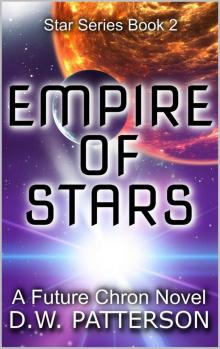 Empire of Stars
Empire of Stars Breakup
Breakup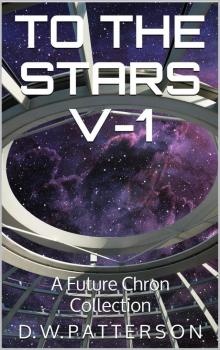 To the Stars V-1
To the Stars V-1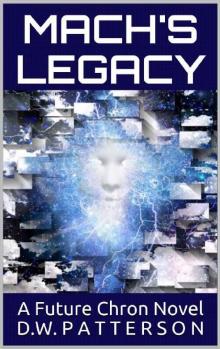 Mach's Legacy
Mach's Legacy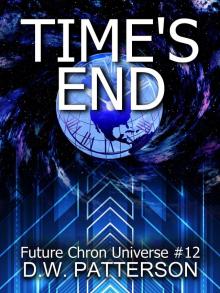 Time's End: A Future Chron Novel (Future Chron Universe Book 34)
Time's End: A Future Chron Novel (Future Chron Universe Book 34) Kuiper Station
Kuiper Station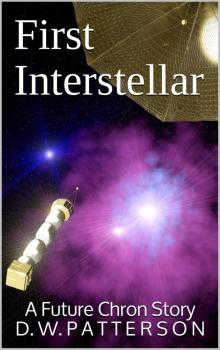 First Interstellar
First Interstellar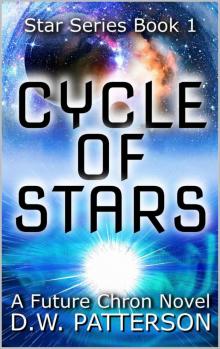 Cycle of Stars
Cycle of Stars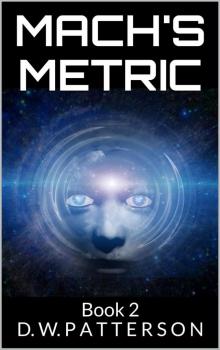 Mach's Metric
Mach's Metric Freedom From Want: A Future Chronology Short Story (Future Chronology Series Book 7)
Freedom From Want: A Future Chronology Short Story (Future Chronology Series Book 7) From the Earth: A Future Chronology Anthology
From the Earth: A Future Chronology Anthology Circle of Retribution: A Future Chronology Short Story (Future Chronology Series Book 6)
Circle of Retribution: A Future Chronology Short Story (Future Chronology Series Book 6)